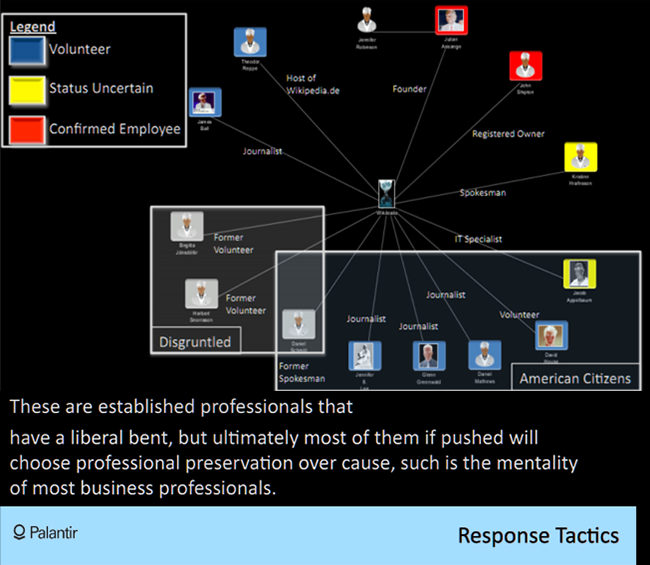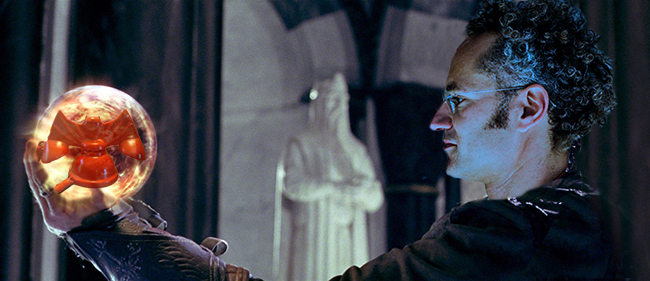
The Palantíri were the Seeing-stones of Middle-earth, the fictional world of J.R. Tolkein in Lord of the Rings. According to legend, the Palantíri [singular Palantir] could only show visions or intended thoughts of the users. Their vision was not hampered by obstacles, but by darkness; they could see through things, but would only see shadow.
That may sound unreliable… but it sells! Welcome to Big Brother meets Big Data!
Palantir Technologies, is a premium Silicon Valley start-up, whose business it’s been to write clever software to track digital footprints, then ‘join the dots’ to predict who you are and what you might do next. Its directors are Peter Thiel, the co-founder of Paypal and first outside investor in Facebook, and Alex Karp, an “eccentric philosopher” who has turned their Palo Alto headquarters into a replica of The Shire from ‘Lord of the Rings’. If it sounds like a fairy story, it is not. Palantir’s software has been labelled the Killer App. It was allegedly used to hunt down and kill Osama Bin Laden.
Palantir is ‘well in’. Its advisors are Condoleezza Rice and George Tenet (ex CIA). It was funded by the CIA, which became a client of Palantir back in 2004. Other government clients are the NSA, the FBI, the NYPD, and a number of counter terrorism and military agencies.
This baby has been valued at five to eight billion dollars and is predicting another billion in private sector deals in 2014. Forbes Magazine reports:
“Palantir is emerging from the shadow world of spies and special ops to take corporate America by storm. Private-sector deals now account for close to 60% of the company’s revenue.”
The identities of corporate clients are usually kept secret, but they include J.P. Morgan, various hedge funds, News Corp and Bank of America – as some will recall from Palantir’s dealings with H.B Gary Federal in a thwarted plan to destroy Wikileaks and its media partner Glenn Greenwald, who instead went on to report on the disclosures of Edward Snowden. The plan may have succeeded, had not Aaron Barr, an employee of H.B. Gary bragged about and published a list of alleged members of Anonymous, which in reality was a list of artists, writers and musicians who had taken an interest in the movement. The injustice of this blunder unsurprisingly triggered a revenge attack on H.B. Gary’s servers from real hackers, who uncovered a Powerpoint file outlining the steps the partners would take to discredit Wikileaks and its associates.
When Anonymous gained access to thousands of emails on H.B Gary’s servers, they found that Palantir had worked with HB Gary Federal to develop proposals for attacking WikiLeaks’ infrastructure, blackmailing its supporters and identifying donors. One idea was to submit false information to the organisation’s drop box, which would later be exposed as such. When the plot was exposed, Palantir put an engineer on leave, apologised for his role in the plan, and cut ties with HB Gary. After that they installed a “Batphone” in Karp’s office, allegedly to receive reports about “unethical clients”, and reinstated their engineer.
One might ask at this stage if these people are elves or the Black Riders.
Palantir Technologies is a perhaps a pioneer in an upcoming consumer industry of selling private information for profit, and they are cheap as chips compared to Booz Allen, IBM and Lockheed Martin. But Forbes Magazine suggests Palantir restrict their services to the top end because some people won’t be happy if they go totally public. Quote: “It helps its customers see too much”.
Really? Alex Karp claims his “turn-key” service (as he calls it) helps the Government go after bad guys. Who those bad guys are he often doesn’t know or succeed in finding out.
“It’s tough”, he says, because his targets don’t leave behind any tangible evidence such as fingerprints or DNA.
Whether they actually are bad guys he takes on faith from his Government or whichever client he is working for, and of course the Batphone. According to former employees, Palantir has sought work in Saudi Arabia despite the staff’s misgivings about human rights abuses in the kingdom, but Karp doesn’t seemed to have picked up on any calls about that issue.
In an interview on the Palantir website, Karp assures us that Palantir are the good guys and he showcases a high profile project where they chased the infiltrators of the Dalai Lama’s computer. He stumbles however when asked who it was and has to admit that it wasn’t really clear in the end whether it was a foreign government or teenagers. That’s a pretty wide margin of error.
Palantir’s so-called predictions hinge on assumptions and probabilities – no light, just shadow – and as it turns out, the “bad guys” are not always bad guys. Sometimes they’re activists; sometimes journalists. Karp loves to drop in the word “turn-key” when he’s selling his crystal ball kit. The irony he doesn’t see is that it is the perfect tool for turn-key totalitarianism. You put all of this surveillance into place and then someone, a new President or Prime Minister, flips the switch to tyranny.
Click. Suddenly the technology is not being used as intended. Click. Anti-war activists are raided by the FBI. Click. Refugee activists are threatened by the Department of Immigration and Border ‘Protection’.
Alex Karp claims to be an advocate for civil liberties. He assured a talk-show host that innocent people would not be “swept into the dragnet”; that the “patterns” his software detects only relate to the activities of terrorists. He says that the data Palantir supplies is “tagged” for one use only, giving the impression that his company has control over who sees what, or how the information will be used.
The US Justice Department’s Inspector General, in a series of reports on FBI practices found systematic disregard for the required procedures for demanding records. False statements in affidavits to telecommunications companies and the FISA Court; improper acquisition of journalists’ phone records; use of national security authorities in cases unrelated to national security; and attempts by superiors to retroactively conceal these improprieties. Speaking of patterns, a pattern of failure to report potential violations to the proper oversight board was also “noted”.
William Binney, a former NSA official, who led a team to develop ThinThread, the agency’s selective and effective pre-911 surveillance tool, resigned because he saw the whole thing spin out of control and his country turn into a police state. Binney baulked when he saw that NSA data was being used to prosecute petty crime, and not many terrorists. Not many at all. Palantir’s director admits that real terrorists are apt to change their patterns and cut their ties as soon as anyone in their circle is arrested. Going after ordinary citizens, on the other hand, is a much more fruitful, easy and lucrative process.
FBI Director Robert Mueller argued that the entire body of phone records is “relevant to an investigation” because it plausibly contains records that will be relevant to some investigation at some point in time. Since these investigations were not only being used to pursue petty criminals but dissidents too, Binney realised that his Government’s actual use of data gathered through spying had become “a Totalitarian Process”. The American Civil Liberties Union describes Palantir as “a true totalitarian nightmare”.
Julian Sanchez from the CATO Institute articulates a problem that possibly none of the hobbits from The Shire had foreseen:
“Such an architecture of surveillance, once established, would be difficult to dismantle and prove too potent a tool of control if it ever fell into the hands of people who — whether through panic, malice, or a misguided confidence in their own ability to secretly judge the public good — would seek to use it against us.”
Unscathed by the plot to destroy his career, Glenn Greenwald worked with Edward Snowden to reveal that this architecture is in place. Mass surveillance of all citizens, an unprecedented level of eavesdropping, with all the dirt ready if your name comes up, to prosecute you for any kind of crime or misdemeanour. And if you happen to be living in ‘The Lucky Country’ of Australia you might already be getting into strife for criticising your Government, even if you use a pseudonym because you happen to work for it.
![]()
The more innocent citizens are spied upon and intimidated, if they get lippy, the more secretive Governments must become to get away with it. Besides an erosion of civil liberties that inevitably becomes unconstitutional, there’s another ‘technical’ issue that makes the whole process dubious:
Evidence stops being ‘forensic’ when it’s only a digital footprint.
Alex Karp admits that and one can only conclude that his company sells nothing but hunches, and that around these hunches his clients have cultivated a devout belief in the stoned philosopher’s Palantiri – and word has it he often is. A cloud of secrecy then prevents sceptics, lawyers and moralists from reality-checking the ‘vision’, and inducing them to assume that a well-paid, well-protected job is being well done. Copies of NSA documents are not even allowed to be passed on for analysis by another Palantir client, the NYPD. And thus, the circle of trust is hermetically sealed, around an irrational, self-serving seat of power that is frightened of our own shadows.
Peter Jackson should make a film about that!






